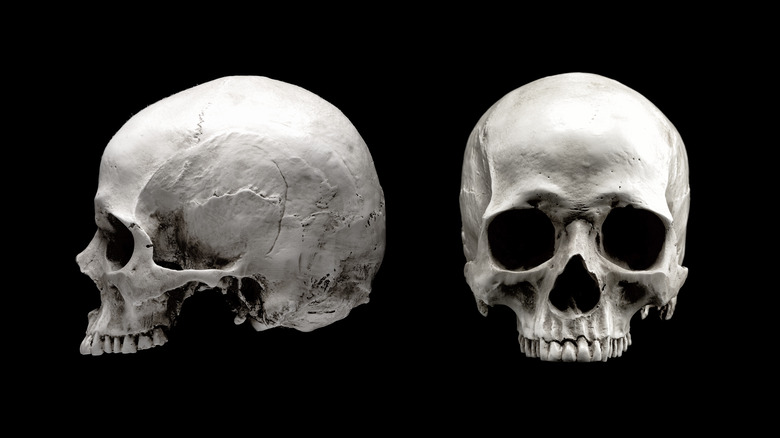Human Brains Have Been Shrinking For 3,000 Years. Here's Why
Have you ever heard of this thing called "the internet"? Yeah, the "shrinking human brain" joke practically writes itself. Pizzagate, flat earthers, Tik-tokers breaking teeth while eating corn on the cob attached to a power drill — the New York Post has a whole list of even worse, facepalm-worthy travesties. This is a mere fraction of the examples that will leave you wondering, "By what dumb luck did our species even make it to 2022?"
Well, it seems that the same quirk of evolution that causes so, so many to be so, so dumb is also the reason why we're shockingly still alive: shrinking brains. Humans are social creatures, like ants. And over thousands of years, we've all become increasingly dependent on others. Society performs many functions that used to be performed by the individual, referred to as "collective intelligence" by a study on Frontiers in Ecology and Evolution. How many of us can kill a mammoth by ourselves and strap its hide to our bodies while building a shelter in the frozen wild? Didn't think so. But 30 of us? Maybe.
At least, that's one interpretation, as NPR discusses. No matter how great a joke, it's not true that "small = dumb." Domesticated animals, for instance, exhibit smaller regions of the brain associated with survival mechanisms — Fido on his doggie bed doesn't exactly have to scrabble for his kibble. But is the socially intelligent, willing-to-please Fido "dumb"?
Bigger than the rest, smaller than before
This news about shrinking human brains might seem counterintuitive. Aren't we always told how big-brained humans are? How else could we have made the Pyramids at Giza, artificial intelligence that writes Beethoven, and the KFC Double Down? All that coordination, all that cooperation, all those calories.
It's true that human brains are the largest out of all primates, relative to our body size: 1,131 to 1,274 cubic centimeters, 86 billion neurons, and three pounds of gray matter goodness (figures per Live Science). As the publication Brain, Behavior and Evolution states (posted at the National Library of Medicine), our brains are three times larger than gorillas or orangutans, who are about as physically large as we are. Smug folk wisdom posits that human brain size has something to do with our so-called "success" as a species. It's also why, the reasoning goes, that Homo sapiens carry on while Homo neanderthalensis (pictured above) went extinct some 44,000-40,000 years ago (as cited on Inverse). It bears noting, though, that Neanderthals had bigger brains than ours, as Discover Magazine states.
As Discover Magazine also states, it's around 40,000 years ago that we see the first evidence of reduced brain size. Since then, Homo sapiens brains have shrunk by about 10%. Before 40,000 years ago, brain size in all 21 human species continued to get bigger, including Australopithecus (3.7-3 million years ago), Homo habilis (2.4-1.6 million years ago), Homo erectus (1.8 million-30,000 years ago), and so on, as Wells Baum writes at Discvr.blog.
Science confirms: Bigger isn't better
So what's up with our shrinking brains? There are lots of potential reasons. Collective intelligence is a big factor. Societal roles have become more individuated, and people need to know how to do fewer and fewer things. Compare an IT infrastructure technician with a survivalist who forages, makes fire, and crafts tools, clothes, and weapons. Which one is more of a globalist, in terms of skills? Because specific regions of the brain associate with specific actions, task specialization could result in an overall reduction in brain size.
Similarly, as Scientific American explains, we've offloaded knowledge for thousands of years. There's no need to remember the name or function of every plant in the forest, or how to find them, when they grow, or how to plant them. People just write all that stuff down. Or more likely, they just Google it.
Additionally, temperatures have risen since the end of the last Ice Age about 10,000 years ago. Smaller bodies (and therefore brains) mean better heat management. That's also about when humans started domesticating plants, which would have an impact on brain development related to different sets of activities. NPR says this could also relate to less aggressive behaviors in humans, overall — similar to domesticated animals.
Finally, smaller brains means smaller skulls. Smaller skulls are easier to deal with in childbirth. Smaller-skulled offspring may have been more likely to survive, and less likely to cause complications at birth.


